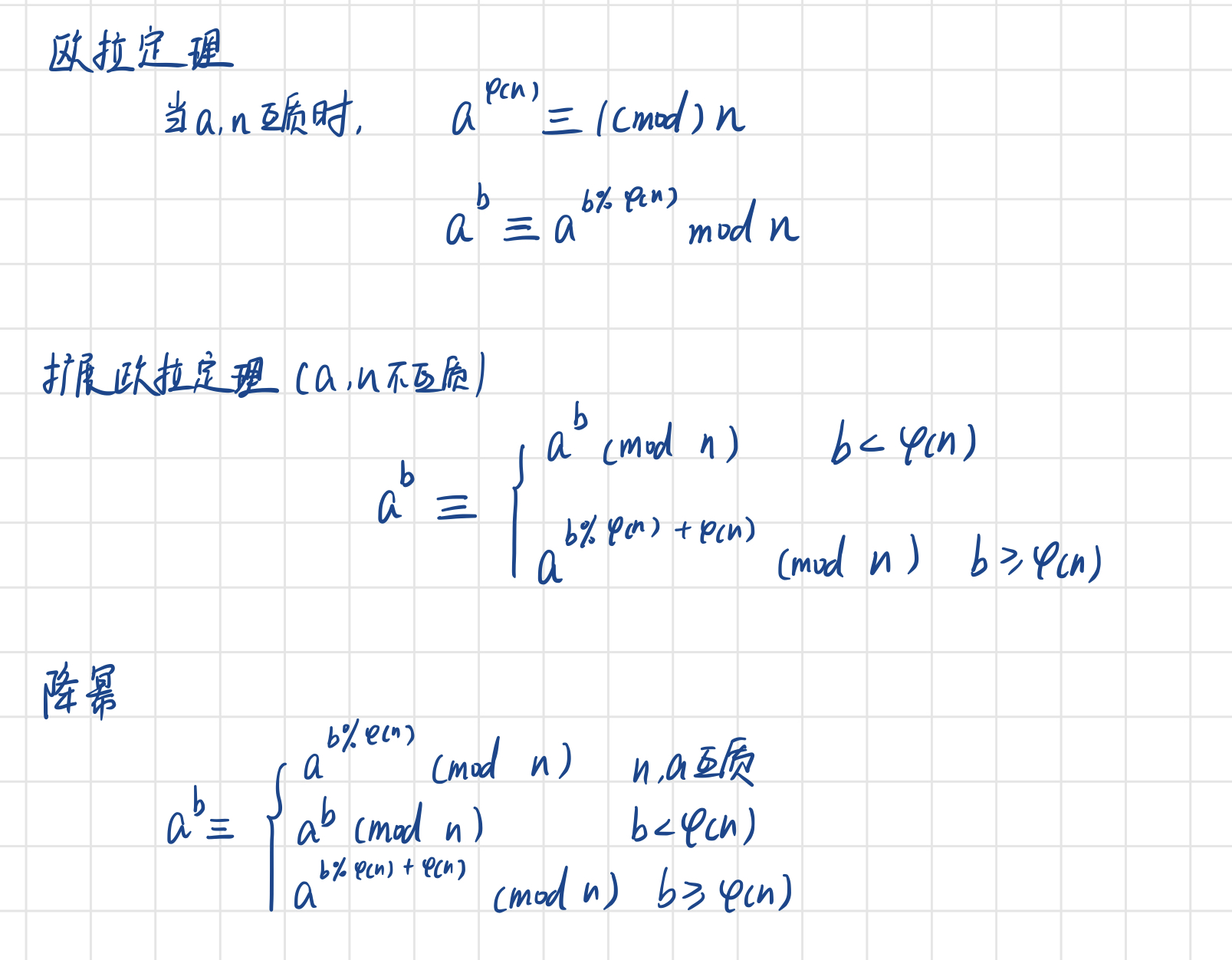In Complexity theory, some functions are nearly O(1)O(1), but it is greater then O(1)O(1). For example, the complexity of a typical disjoint set is O(nα(n))O(nα(n)). Here α(n)α(n) is Inverse Ackermann Function, which growth speed is very slow. So in practical application, we often assume α(n) le 4α(n)≤4.
However O(α(n))O(α(n)) is greater than O(1)O(1), that means if nn is large enough, α(n)α(n) can greater than any constant value.
Now your task is let another slowly function log*log∗ xx reach a constant value bb. Here log*log∗ is iterated logarithm function, it means “the number of times the logarithm function iteratively applied on xx before the result is less than logarithm base aa”.
Formally, consider a iterated logarithm function log_{a}^*loga∗
Find the minimum positive integer argument xx, let log_{a}^* (x) ge bloga∗(x)≥b. The answer may be very large, so just print the result xx after mod mm.
Input
The first line of the input is a single integer T(Tle 300)T(T≤300) indicating the number of test cases.
Each of the following lines contains 33 integers aa , bb and mm.
1 le a le 10000001≤a≤1000000
0 le b le 10000000≤b≤1000000
1 le m le 10000001≤m≤1000000
Note that if a==1, we consider the minimum number x is 1.
Output
For each test case, output xx mod mm in a single line.
Hint
In the 4-th4−th query, a=3a=3 and b=2b=2. Then log_{3}^* (27) = 1+ log_{3}^* (3) = 2 + log_{3}^* (1)=3+(-1)=2 ge blog3∗(27)=1+log3∗(3)=2+log3∗(1)=3+(−1)=2≥b, so the output is 2727 mod 16 = 1116=11.
样例输入
5 2 0 3 3 1 2 3 1 100 3 2 16 5 3 233
样例输出
1 1 3 11 223
题解:求a^a^...(b次)%n的结果。因为n与a不一定互质,所以要利用广义欧拉定理进行降幂。

AC代码:
#include<iostream> #include<algorithm> #include<cstdio> #include<cstring> #include<queue> #include<set> #include<cmath> #include<string> #include<map> #include<vector> #include<ctime> #include<stack> using namespace std; #define mm(a,b) memset(a,b,sizeof(a)) typedef long long ll; typedef unsigned long long ull; const int maxn = 2e5 + 10; #define inf 0x3f3f3f3f const double PI = acos(-1.0); ll gcd(ll a,ll b){return b==0?a:gcd(b,a%b);} #define Mod(a,b) a<b?a:a%b+b //根据欧拉定理重定义mod ll fpow(ll a,ll n,ll mod) { ll res=1; while(n) { if(n&1) res=Mod(res*a,mod); a=Mod(a*a,mod); n>>=1; } return res; } ll phi(ll x) //求x的欧拉函数 { ll ans=x,tp=sqrt(x); for(ll i=2;i<=tp;++i) { if(x%i==0) { ans=ans-ans/i; while(x%i==0) x/=i; } } if(x>1) ans=ans-ans/x; return ans; } ll solve(ll a,ll b,ll m) { if(m==1) return 0; if(b<=1) return fpow(a,b,m); ll p=phi(m); ll t=solve(a,b-1,p); //递归求解 ll g=gcd(a,m); if(g==1||b<p) return fpow(a,t,m); else return fpow(a,t+p,m); } int main() { int T; scanf("%d",&T); while(T--) { ll a,b,m; scanf("%lld %lld %lld",&a,&b,&m); ll ans=solve(a,b,m)%m; printf("%lld ",ans); } return 0; }